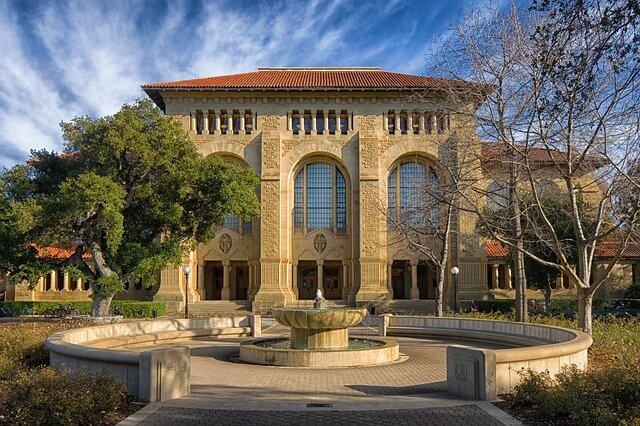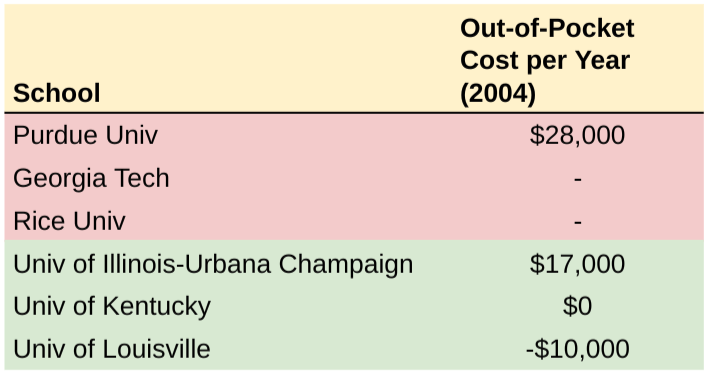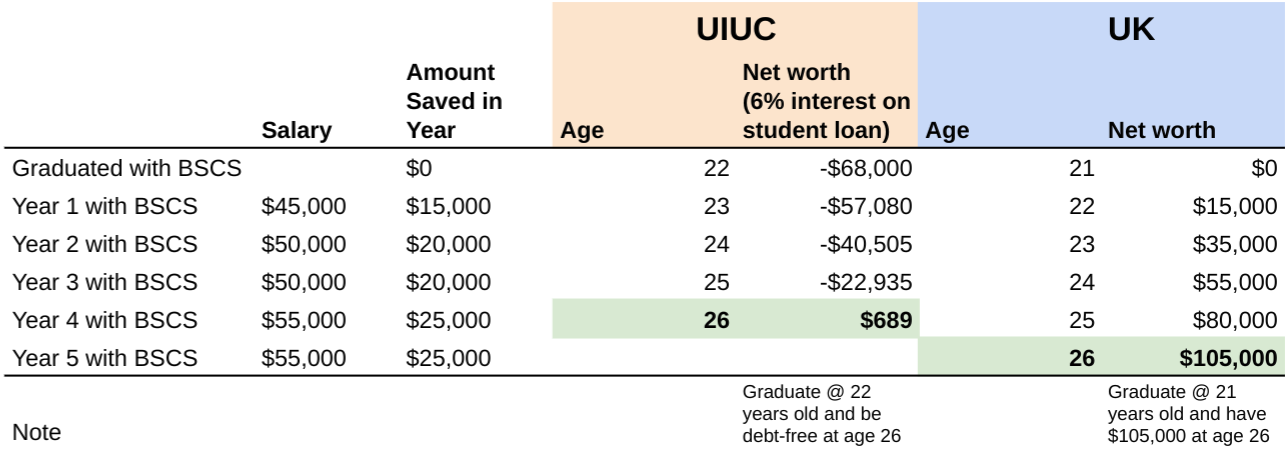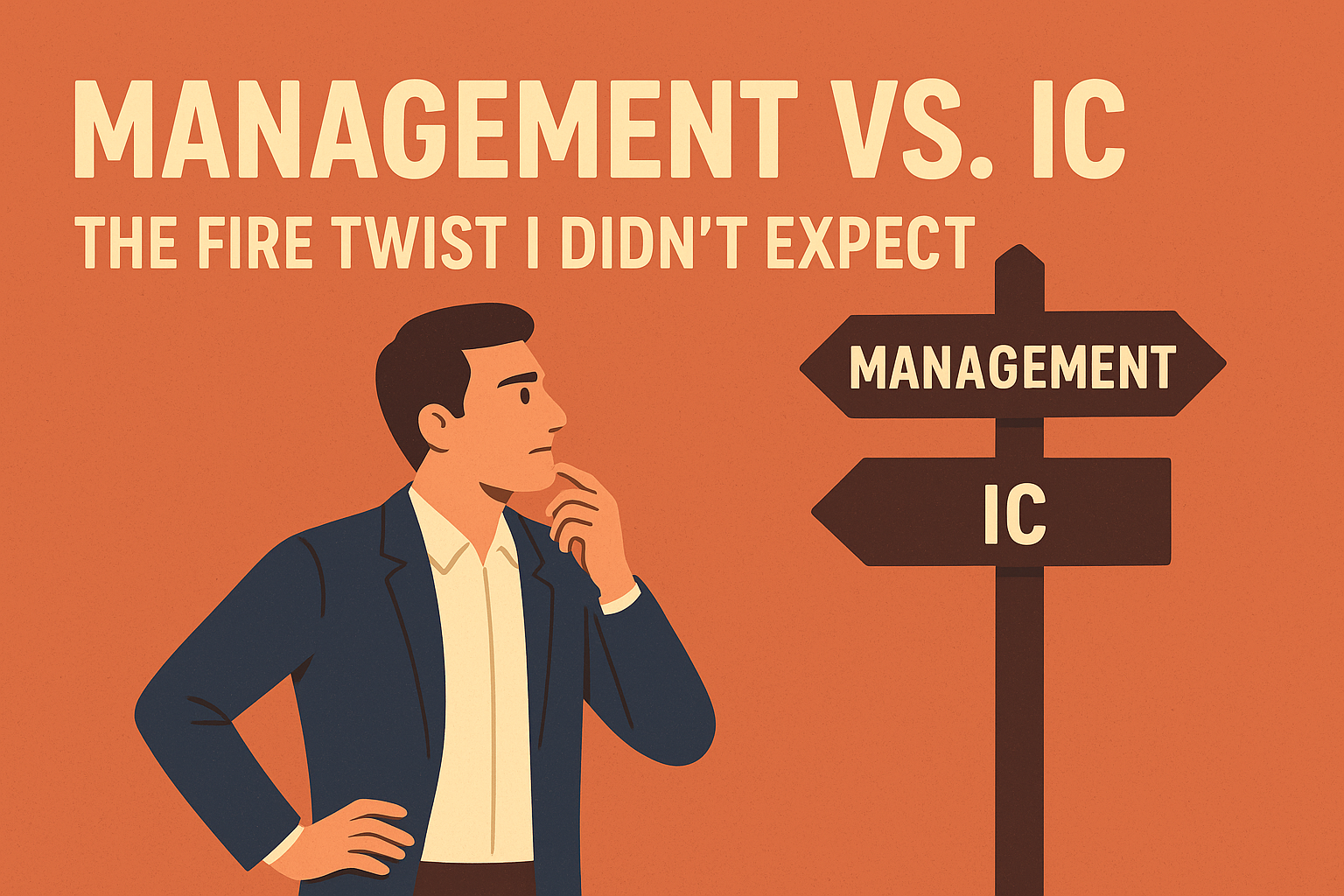In-state vs Out-of-state Universities — 4 things to consider
Choosing a college is a big decision, especially for a 17-year-old. I remember feeling excited, grown-up, eager, and free. But I also remember feeling nervous, scared, uncertain, and bounded by my family's financial situation. It was not only a 4-year decision but also a $50k to $150k decision for me.
In this article, I'll step through the thought process of my 17-year-old self. I'll then follow up at the end with my retrospective of the decision, after 15 years. In short, for any 17-year-old thinking that this is the most important decision in their life, it's not--unless you choose to go into massive debt.

Fall of 2004
It was the Fall of 2004 when I started to apply to colleges. I had applied to the schools that I thought I could 1) get in to and 2) get enough scholarships and grants to pay for them.
From what I recall, I applied to the following schools: Purdue, Rice, Univ of Illinois-Urbana Champaign (UIUC), Georgia Tech, Univ of Louisville (UL), and Univ of Kentucky (UK). The last two were my state schools and were significantly cheaper than the first 4 on that list.
On my path to choosing a school, I factored in several components. Below is my thought process in 2004. It may seem organized and structured now, but it was anything but that at the time.
(adsbygoogle = window.adsbygoogle || []).push();
4 things to consider
1. Cost - the number one filter for me was the cost of the school. I could have chosen to pay (after scholarships and financial aid) $17k a year to go to one of the top engineering schools in UIUC or go to Purdue for $28k a year. These numbers are still ingrained in my memory because I did the math over and over again, only to disappoint myself with how much it costs. Or I could have gone to the University of Kentucky (UK) or the University of Louisville (UL) for free.

In fact, I could have gone to the UL for free AND get paid $10k a year. How? It’s because I had stacked up a lot of scholarships & grants and could live at home.
After applying this filter, I eliminated Purdue based on cost. And eliminated Rice University and Georgia Tech because they didn't accept me :). It was now down to UIUC, UL, and UK.
2. Time to complete a degree - the second filter I applied was how many credits would the school grant me for all of the AP tests that I passed. UIUC essentially gave me nothing. UL gave me some, but UK gave me ~35 credit hours. This means that if I attended UK, I would have had enough credits to be considered a sophomore from Day 1. So instead of graduating in 4 years, I would have theoretically graduated in 3. Instead of paying for 4 years of college, I would only pay for 3. This was very enticing, but at the same time, UIUC’s reputation was hard to ignore. After all, isn’t college all about the experience?

3. Understanding the expected salary - I knew I wanted to study Computer Science. And when I looked up the entry-level salary for a Computer Science new grad, I saw that it was ~$45,000 per year. (Note: At the time, $45,000 was a significant amount in Kentucky. For comparison’s sake, I grew up in a 3 bed and 2 bath house that we bought for $82,000).
But what was the max I could make? What if I had the best grades, crushed the job interviews, and outperformed everyone else? How much could I have made? The closest proxy I had was my friend's mom. She had been working as an engineer for over 20 years and was making around $85,000 a year.
After my "research" in 2004, I naively concluded that I'd start out making $45,000 a year and approach $100,000 as I reached the tail end of my career. More on this later.
(adsbygoogle = window.adsbygoogle || []).push();
4. Opportunity cost - I didn't even know what "opportunity cost" meant at the time, but I thought to myself, how long will it take me to pay back $68k ($17k over 4 years) when I'm making $45k a year? What kind of job opportunities will I get at UIUC that I wouldn’t be exposed to at UK? That line of thinking led me to do a cost-benefit analysis. And at this point I was realistically debating between UIUC and UK because UL did not have a pure Computer Science program. This is what I remember charting out:

Essentially, it was graduate at 22 years old, be debt-free at the age of 26 OR graduate at 21 years old, and have $105,000 at the age of 26. Were the out-of-state college experience and the opportunities at UIUC worth the difference? Was it worth more than the house that I grew up in? Probably not…and that’s when I made the decision to go to UK for my BS in Computer Science.
It turned out to be one of the best decisions of my life.
Retrospecting in Fall of 2019
So what happened after Fall 2004 when I decided to go to that state school? A lot. Here are some of the highlights:
-
During my college years, I worked multiple part-time jobs that paid $10/hr. I also worked an 8-month internship that paid $22.75/hr.
-
I graduated with a net worth of $30,000.
-
Instead of going to school for the projected 3 years (i.e. 6 semesters), I ended up graduating in 5 semesters.
-
I expected to make $45,000 as an entry-level engineer, but I ended up making $65,000 in my first job.
-
In order to keep up with my friends who attended the top schools, I often asked for their homework to see if I could do them. Once, I even volunteered to help with one of their group projects. If nothing else, this had a significant impact on my confidence. Made me feel I could hang.
-
When I was 23 years old, I went on a recruiting trip to interview 22-year-olds at MIT.
-
I expected to have a better career in engineering if I went to UIUC. Oddly, I never get asked where I went to college. That's something people ask for your first job. But having done a tour of duty at the most prestigious tech companies in Silicon Valley, I deeply believe that academic background has very little to do with on-the-job success, career progression, or compensation.
-
In summary, my education and career has far exceeded the expectations I had for myself in 2004.
As I listened to a podcast on the way to work, I was reminded of how much student loan debt we have today in our country. I was reminded of how many millennials are "behind in life." And was reminded of how important it is to always have a plan. While my story may be 15 years old, it is still a reality for many high school students today. I'm hoping to inspire at least one other person to do an honest cost-benefit analysis before deciding what their "dream" school looks like.
Featured
[

](/blog/the-post-financial-independence-life-no-one-talks-about)
The Post-Financial Independence Life No One Talks About
[

](/blog/im-building-a-fire-tool-and-i-need-your-input)
I’m Building a FIRE Tool — and I Need Your Input
[

](/blog/management-vs-ic-the-fire-twist-i-didnt-expect)
Management vs IC: The FIRE Twist I Didn’t Expect
2024 Year in Review - Top 6 highlights
[

](/blog/3-things-that-make-fire-hard)
[

](/blog/2023-year-in-review-top-6-highlights)
2023 year in review - top 6 highlights
[

](/blog/5-tips-on-how-to-get-promoted-in-a-big-company)
5 Tips on how to get promoted in a big company
[

](/blog/is-4000000-still-a-good-fire-number)
Is $4,000,000 still a good FIRE number?
[

](/blog/stock-market-is-back-to-near-all-time-highs)
Stock market is back to near all-time highs
[

](/blog/3-ways-i-might-make-money-in-2023)
3 Ways I Might make money in 2023
(adsbygoogle = window.adsbygoogle || []).push();
Enjoyed this post?
Subscribe to get my latest posts on financial independence, investing, and the journey to FIRE delivered straight to your inbox.
More Posts

Trump Accounts: Free Money for Your Kids (And How to Maximize It)

5 Things I'm Focused On In 2026

Comments